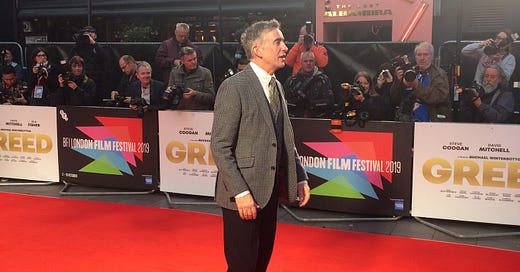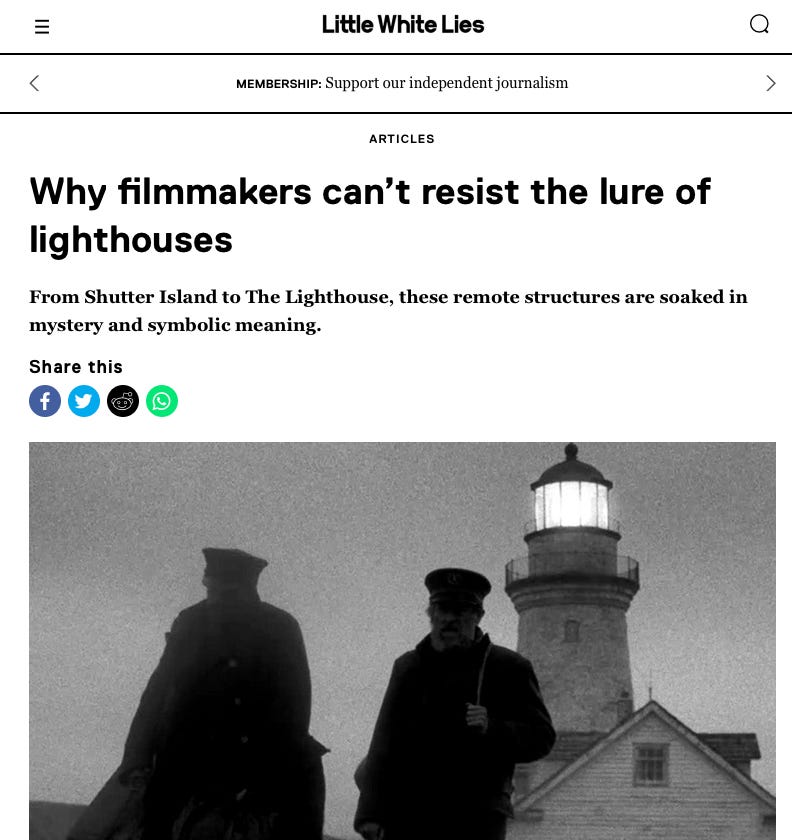Dear friends,
Tomorrow marks the beginning of this year’s London Film Festival. Twelve days of brand new, carefully curated, world cinema. Every night there’s a Headline Gala at the Southbank Centre’s Royal Festival Hall - a UK, European or world Premier - when members of the public get to share the red carpet with the stars. This year, the festival opens with the world premier of Roald Dahl’s Matilda The Musical starring Emma Thompson, Stephen Graham and Andrea Riseborough. There’s the UK premier of White Noise, directed by indie darling Noah Baumbach, based on the so-called ‘unfilmable’ novel by Don DeLillo. And my most anticipated film of the year: BARDO, False Chronicle of a Handful of Truths, from one of my favourite directors, Oscar winner Alejandro G. Iñárritu (Buitiful, Birdman, The Revenant).
LFF is my Glastonbury. The time of year when I get up at the crack of dawn to stand in line at 8am chatting to strangers about obscure films unlikely to be shown outside the capital city. The time of year when I reluctantly accept just how London-centric the UK’s film scene is and go all-in. I’ve spent the last two weeks combing through the press programme and refining my schedule. Past experience tells me these will be the most intense days of my year - watching three or four films a day, spending every spare moment making copious notes in an attempt to capture the mood of each film and remember every cinematic detail.
An LFF press pass is a glorious thing but, for those of us living outside London, attendance remains an expensive investment. I try to see as much as I can, watching films that won’t be released in UK cinemas for another six to twelve months. The plan is always to pitch enough articles over the year to make back what I’ve spent attending. But, given the competitive nature of film journalism and the lack of cash floating around print and digital publications right now, this rarely happens. And so, inevitably, the press queues are packed with writers there for the sheer love of film. Standing around in the morning cold, there’s a buzz in the air, an eagerness, an anticipation, that I’ve rarely experienced elsewhere. LFF is one of the few places I feel at home making conversation with people I’ve just met, going beyond the boundaries of British small talk about the weather and the commute. If you blog or write about film in any capacity - a blog or social media - I urge you to apply for a press pass in 2023, you won’t regret it.
What’s great about LFF is that it is, first and foremost, a public festival. Paying cinema-goers, eager movie-buffs and curious newcomers get to share this incredible vibe, seeing the same films just a few hours after the press, and many months before their general release. In fact, press reactions are embargoed for world premiers until after the first public screening - meaning everyday film fans are among the very first people to go live with their thoughts on social media. Public screenings often include Q&As with the filmmakers and there’s even a series of Screen Talks with actors and directors. This year the line-up includes Jennifer Lawrence, Bill Nighy and Mia Hansen-Løve.
The Festival programme is a behemoth; there are a whopping 164 feature films to choose from and the variety is staggering. To make things easier, the curators organise the screenings into nine key strands: Love; Laugh; Debate; Dare; Thrill; Cult; Journey; Create; and Experimenta. If you like your films to challenge you, or reflect on the art itself, try the Dare, Create and Experimenta strands. If you’re looking for something current and thought-provoking, you’ll find these in Debate. Some of my favourite films have come from this strand in the past. This year, Debate is home to a number of exciting films about women and gender inequality. I’m looking forward to Brainwashed: Sex-Camera-Power, a documentary about cinema and the male gaze; Declaration, an Indian drama about a compromising video circulated without the couple’s consent; and Palm Trees and Power Lines, a coming-of-age drama about the grooming of a 17 year old girl in modern-day America. For those who can’t make it to London, a selection of films will be available to stream on BFI Player for two weeks after the festival ends.
I’ve already been lucky enough to see Hidden Letters, a documentary about Nushu - the only known language developed and used solely by women. Created in secret in rural China, by women who had their feet bound and were often confined to their chambers, Nushu poems and songs offered a sense of hope, a way of communicating experiences with other women who understood.
The focus of Hidden Letters is the complex status of Nushu in modern China, since the language was made public in the 1980s. While young women continue to share experiences of domestic abuse and describe male expectations of female domestic servitude, the Nushu language is being co-opted by men for commercial gain. Directors Violet Du Feng and Zhao Qing make it clear that Nushu has largely been misunderstood by China’s male audience - cutting together female experiences with male viewpoints and commercial advertising. In one eye-opening interview, the former manager of the Nushu Museum (a middle-aged man) claims Nushu is:
“About obedience, acceptance, and resilience. As long as women have these three values we’ll still have a good society. But few women embody those values nowadays.”
But this is not how the film’s women see Nushu at all. Contrast his feelings with this Nushu line:
“A man dreams to conquer the world. Does a woman dream any less?”
Reassuringly, the film’s young women reach inside themselves and find the spirit of Nushu still strong. Running through Hidden Letters is a beautiful, burgeoning friendship between a young divorcee, Hu Xin, and an older woman, He Yanxin, who explains how Nushu helped her to escape the sadness of bullying and domestic slavery. Their empathy provides the emotional anchor of this sensitively made, thought-provoking film. Its themes of mansplaining and gender inequality continue to resonate, not just in China, but across the globe. Here’s how you can see it:
Keep an eye on your inboxes for more from the festival as it progresses. If you would like to follow my daily film updates, you can find me on Twitter and Instagram. In the meantime, here are a couple of pieces I wrote about films shown at the 2019 festival, please click the images to read more:
Thank you for reading. If you haven’t already, please subscribe for free to receive new posts and support my work.
If you’d like to get in touch or share your picks for this year’s festival please leave a comment below, I’d love to hear from you!
Featured image is Steve Coogan on the red carpet for the premier of Greed at the London Film Festival in 2019. Photograph is my own.







I know. I'm way behind with your emails. I really enjoyed your post on lighthouses. I absolutely agree on the mystery they inspire. Reading about Hidden Letters, the film, I felt disgusted by the statement of the former manager of the Nushu Museum who clearly thinks that a 'good society' is one stuck in the past and which favors male needs. He says 'few women embody those values nowadays'. Good for them as we are in the 21st century after all.